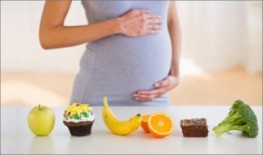This fact sheet provides an overview of 8 of the most important nutrition elements during pregnancy.
Protein and calcium are critical, so we also created a video highlighting how to make a banana smoothie rich in both of these components. Click here to visit the Ohana Videos page. You can make this smoothie for a protein-rich breakfast or incorporate as an afternoon snack. You can also check out our library of recipes that incorporate high levels of essential nutrients for pregnancy.
Protein
- Protein forms the building blocks of your baby’s systems. It is important to get all the amino acids, which are used in different places in the developing fetus.
- An average-sized female should eat 60-70g of protein per day while pregnant (up from about 40g per day recommended when not pregnant).
- Good sources of protein include chicken, yogurt, edamame, beans.
- If you eat fish, avoid types high in mercury like shark, swordfish, or king mackerel.
Calcium
- Calcium helps reduce the severity and overall risk of low birth weight, and preterm delivery.
- Pregnant women should consume 1,000mg of calcium daily.
- Yogurt has 450mg per cup—double the amount in milk.
Iron
- Iron helps carry oxygen to your organs, tissues, and baby. Iron deficiency can impair baby’s growth and increase the risk of hypertension, preterm delivery, and low birth weight.
- You need more iron during pregnancy to support the growth of baby and to produce extra blood. Aim to get 27mg of iron per day.
- A bowl of fortified cereal contains 10mg—more than a serving of beef.
Zinc
- Zinc is linked to a lowered risk of preterm delivery, low birth rate, and prolonged labor. It also prevents intrauterine growth retardation.
- Pregnant moms need 11μg (micrograms) a day.
- Baked beans contain 1.8μg zinc.
Folic Acid
- Folic acid decreases the risk of birth defects.
- You need 600μg every day.
- Spinach, asparagus, and oranges all contain folic acid.
Beta Carotene
- This is critical for proper cell and gene development. It also improves skin and vision, and recharges your immune system.
- You should eat 7,700 IU per day.
- Sweet potatoes contain 50,000 IU in one cup.
DHA
- Higher levels of DHA in newborns correspond to higher birth weight, higher IQ, more advanced motor skills, and fewer emotional and neurological problems later.
- New moms need 450mg per day.
- A 4-oz serving of salmon contains 130 mg.
Water
- The average pregnant woman’s blood volume increases from about 2600mL to 3850mL, which happens mainly in the second and third trimesters.
- Water flushes waste produces from the cells and aids in liver and kidney function.
- Insufficient water intake can factor in constipation, exacerbated Braxton Hicks contractions, preterm labor, and miscarriage.
- Even slight dehydration can cause or contribute to fatigue.
- Avoid caffeine and high-sugar beverages, which dehydrate you.
Sources: The Baby Bump by Carley Roney & U.S. National Library of Medicine. “Blood Volume Changes in Normal Pregnancy.” http://www.ncbi.nlm.nih.gov/pubmed/4075604.

